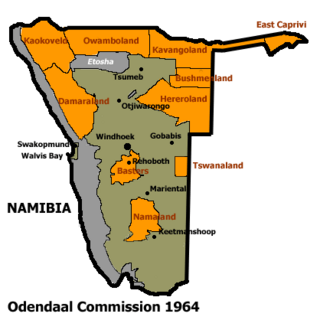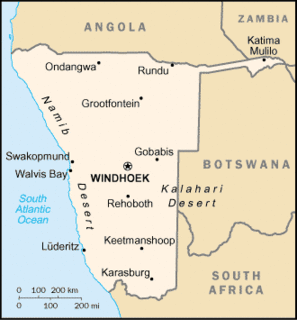| UN Security Council Resolution 601 | |
|---|---|
Namibia | |
| Date | 30 October 1987 |
| Meeting no. | 2,759 |
| Code | S/RES/601 (Document) |
| Subject | Namibia |
Voting summary | 14 voted for None voted against 1 abstained |
| Result | Adopted |
| Security Council composition | |
Permanent members | |
Non-permanent members | |
United Nations Security Council resolution 601, adopted on 30 October 1987, after recalling resolutions 269 (1969), 276 (1970), 301 (1971), 385 (1976), 431 (1978), 432 (1978), 435 (1978), 439 (1978), 532 (1983), 539 (1983) and 566 (1985), the Council again condemned South Africa for its continued "illegal" occupation of Namibia and its refusal to comply with previous resolutions.
United Nations Security Council Resolution 269, adopted on August 12, 1969, condemned the government of South Africa for its refusal to comply with resolution 264, deciding that the continued occupation of South West Africa was an aggressive encroachment on the authority of the United Nations. The resolution also called for South Africa to remove its administration of South West Africa before October 4, 1969, calling on all states to refrain from dealings with either country and noting it would consider a further meeting if the present resolution was not implemented to discuss further action the Council could take.
United Nations Security Council Resolution 276, adopted on January 30, 1970, after reaffirming previous resolutions and statements, the Council condemned South Africa's continued occupation of Namibia as illegal and decided to establish an ad hoc sub-committee to study the ways and means by which the Council's resolutions could be implemented. The Council requested all states and organizations give the sub-committee all the information and other assistance it may require and further requested the Secretary-General to give every assistance to the sub-committee.

United Nations Security Council Resolution 301, adopted on October 20, 1971, after reaffirming previous resolutions on the topic, the Council condemned the Bantustans, which they described as moves designed to destroy unity and territorial integrity along with South Africa's continued illegal presence in Namibia, then known as South West Africa.
Contents
The resolution reaffirmed the direct responsibility of the United Nations over the territory of Namibia, noting that all outstanding issues relevant to Resolution 435 (1978) have been resolved. It also welcomed the pledge by the South West Africa People's Organization to sign and observe a ceasefire with the South African Defence Force, therefore the Council authorised the Secretary-General Javier Pérez de Cuéllar to arrange a ceasefire between both parties in order for the emplacement of the United Nations Transition Assistance Group in Namibia.

SWAPO, or the South West African People's Organisation and officially known as SWAPO Party of Namibia, is a political party and former independence movement in Namibia. It has been the governing party in Namibia since the country achieved independence in 1990. The party continues to be dominated in number and influence by Ovambo people.

A ceasefire, also called cease fire, is a temporary stoppage of a war in which each side agrees with the other to suspend aggressive actions. Ceasefires may be declared as part of a formal treaty, but they have also been called as part of an informal understanding between opposing forces. A ceasefire is usually more limited than a broader armistice, which is a formal agreement to end fighting. Successful ceasefires may be followed by armistices, and finally by peace treaties.

The South African Defence Force (SADF) comprised the South African armed forces from 1957 until 1994. Shortly before the state reconstituted itself as a republic in 1961, the former Union Defence Force was officially succeeded by the SADF, which was established by the Defence Act of 1957. The SADF, in turn, was superseded by the South African National Defence Force in 1994.
The Council also urged Member States to assist the Secretary-General and his staff with the implementation with the current resolution, and requested the Secretary-General to report back as soon as possible regarding developments in the region. [1]
Resolution 601 was adopted by 14 votes to none, with one abstention from the United States.
Abstention is a term in election procedure for when a participant in a vote either does not go to vote or, in parliamentary procedure, is present during the vote, but does not cast a ballot. Abstention must be contrasted with "blank vote", in which a voter casts a ballot willfully made invalid by marking it wrongly or by not marking anything at all. A "blank voter" has voted, although their vote may be considered a spoilt vote, depending on each legislation, while an abstaining voter hasn't voted. Both forms may or may not, depending on the circumstances, be considered to be a protest vote.





